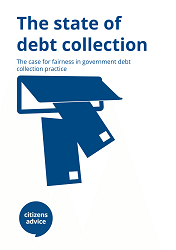The state of debt collection - the case for fairness in government debt collection practice
Between 2005/6 and 2014/15 the number of local and national government debt issues that Citizens Advice helped people with has more than doubled.

The state of debt collection: the case for fairness in government debt collection practice 1.04 MB reviews our clients’ and their advisers’ experiences of dealing with debts owed to government. We found that our clients can suffer detriment when public bodies have uncoordinated and inconsistent approaches to debt collections. Our evidence shows that central government debt collection lags behind the higher standards expected of other creditors, including water companies, council tax collection departments, banks and private debt collectors.
Key issues we identified included:
The public sector is mostly out of step with financial services and utility companies in that it does not have an open or consistent approach to assessing affordability. When debt payments are not affordable people can be left unable to pay for essentials such as food and heating, and may be unable to stick to their payments, or be unable to deal with their priority debts.
National government debt collectors are rated poorly at communicating - answering the telephone and responding to letters. Creditors need to maintain high standards in their communications because failures in this area can make it more difficult for people to pay their debts, for important questions to be answered and for problems to be resolved.
We found evidence of poor practice, including public bodies asking people to pay money while a debt was being disputed, very old debts being collected even though proof of the debt was not made available, aggressive enforcement being used against people who had outstanding benefit claims that could settle a debt, and an inflexible attitude to people who need time to take advice, or make payments.
Partnership working between advice agencies and local authorities is widespread but not universal. Over half of our survey respondents reported that councils refer clients to their local free, independent advice agencies for debt advice, and nearly half of the advisers reported that their council was willing to work with local advice agencies and learn from their clients’ experience. Adviser comments also recorded strong support for councils that continue to take responsibility for debt collection even after the issue has been passed to an enforcement agent, and that take into account outstanding benefit claims and other debts that people have.
The report’s overarching recommendations are:
Central Government should work with the private sector, Citizens Advice and the other advice charities to develop a best practice debt collection protocol which is publically available.
Local authorities should implement existing guidance and use the council tax collections protocol, as endorsed by the Local Government Association.
Local authorities should draw up corporate debt collection strategies. These should connect council tax collection with other local authority debt collection and benefit processing systems, and be based on clearly articulated good practice principles.
We make further recommendations for local and national government detailing key elements of good debt collection practice.